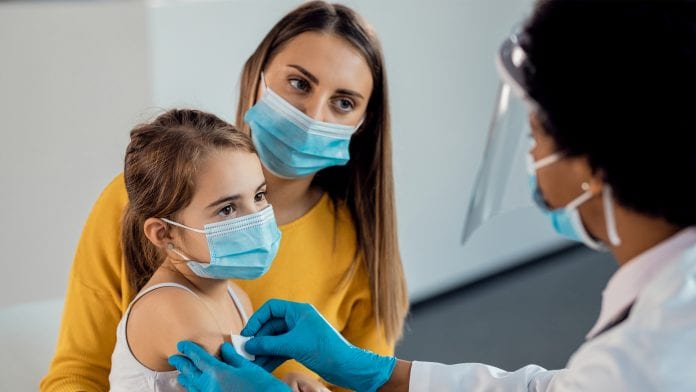
A clinical trial has proven that the CoronaVac COVID-19 vaccine is safe for children and adolescents aged between three to 17.
The CoronaVac vaccine, which is manufactured by Sinovac, has recently been approved for emergency use in China for children over the age of three. In a randomised controlled trial of the vaccine, researchers concluded that two doses of the vaccine are safe and generate a strong antibody response.
The findings have been published in The Lancet Infectious Diseases journal.
Protection from SARS-CoV-2
In the study of 550 young people, over 96% of children and adolescents who received two doses of the vaccine developed antibodies against SARS-CoV-2. Most adverse reactions were mild or moderate, with pain at the injection site the most commonly reported symptom.
Qiang Gao, of Sinovac Life Sciences Co, Ltd, China, said: “Children and adolescents with COVID-19 usually have mild or asymptomatic infections compared with adults; however, a small number may still be at risk of severe illness. They can also transmit the virus to others, making it vital to test the safety and effectiveness of COVID-19 vaccines in younger age groups. Our finding that CoronaVac was well tolerated and induced strong immune responses is very encouraging, and suggests that further studies in other regions, involving larger, multi-ethnic populations, could provide valuable data to inform immunisation strategies involving children and adolescents.”
The authors conducted a randomised, double-blind, controlled phase 1/2 clinical trial of CoronaVac in healthy children and adolescents, aged three to 17 years old, in Zanhuang County, China. Between 31 October and 2 December 2020, 72 participants were enrolled in phase 1, with 480 participants enrolled in phase 2 between 12 December and 30 December 2020. The vaccine (either 1.5μg or 3μg per dose) or a control was given by intramuscular injection in two doses, at day zero and day 28. In studies involving adults aged 18 to 59 years and people aged 60 years and older, participants received two doses of 1.5μg, 3μg, or 6μg, with 3μg doses suggested for use in further research.
Mild or moderate adverse reactions
Among the 550 participants who received at least one dose of vaccine or the control, adverse reactions within 28 days occurred in 56 of 219 participants in the 1.5μg group, 63 of 217 in the 3μg group, and 27 of 114 in the control group. Most adverse reactions were mild or moderate, with pain at the injection site being the most commonly reported symptom. Only one serious adverse reaction – a case of pneumonia – was reported in the control group; however, this was said to be unrelated to the COVID-19 vaccination.
Immune response
In phase 1, 100% of participants in both the 1.5μg and 3μg groups generated antibodies against SARS-CoV-2. Stronger immune responses – determined by the amount of antibodies produced that can neutralise the virus, expressed as geometric mean titre (GMT) – were detected among the 3μg group compared with the 1.5μg group. In phase 2, 97% of participants in the 1.5μg group produced antibodies against SARS-CoV-2, compared with 100% in the 3μg group. Participants in the 3μg group again produced a stronger immune response than those in the 1.5μg group. Similar to findings for other vaccines that increasing age is linked with reduced immune responses, the authors note that immune responses among children and adolescents were higher than those in adults aged 18 to 59 years old and elderly people aged 60 years and older.
No significant differences in immune response were detected in an analysis by age group, with more than 93% of those in the 1.5μg and 3μg groups aged three to five years, six to 11 years, and 12 to 17 years producing antibodies against SARS-CoV-2 (with GMTs ranging from 78 to 146) at day 28 after the second dose. In each age group, there were significant differences in GMTs between the 1·5 μg and 3·0 μg groups after the second dose, except in the group aged 12 to 17 years old in phase 1.
Based on their results, the authors recommend two 3μg doses of the vaccine for children and adolescents aged three to 17 years.
Further research needed
Despite the promising findings, authors do note some limitations to their study, including the fact that T cell responses – which play an important role in SARS-CoV-2 infections – were not assessed, though these have been investigated in related studies.
Researchers also acknowledge that the number participants was small and concentrated, with all participants being of Han ethnicity. They recognise a need for larger studies in other regions and involving multi-ethnic populations. Additionally, long-term safety and immune response data were not available, though participants will be followed for at least one year.
In calling for longer follow-up assessments in children, Professor Cao also emphasises the vital importance of determining the safety of vaccines in younger age groups, saying: “While vaccinating children is essential to reach herd immunity and limit the severity of COVID-19, safety should be the paramount factor to be considered before COVID-19 vaccines can be rolled out in younger children.”

























